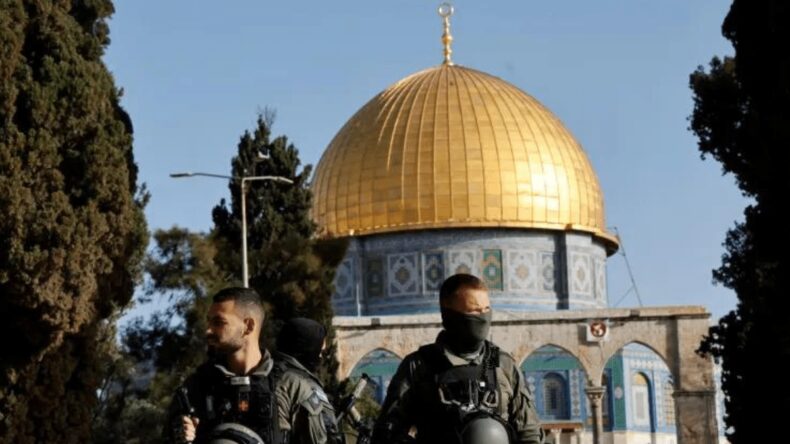Israeli forces firing stun grenades and arresting worshippers inside Al-Aqsa in Jerusalem has escalated tensions between Israelis and Palestinians.
Table of Contents

On April 5th, Israeli police stormed the Al-Aqsa compound in East Jerusalem in a violent raid, arresting and attacking Palestinian worshippers. Witnesses reported that Israeli forces used excessive force, including stun grenades and tear gas, which caused suffocation injuries to the worshippers, as well as beatings with batons and rifles.
Twelve injuries were reported by the Palestinian Red Crescent, three of which required hospitalization. Israeli forces also prevented medics from reaching the mosque.
Excessive force used against Palestinian worshippers

Image Source: Twitter
At least 400 Palestinians were detained by Israeli forces at a police station in Atarot, occupied East Jerusalem. Israeli forces were seen assaulting, pushing, and preventing Palestinians from praying inside the mosque compound on Wednesday morning. Israelis were then allowed in under police protection. The incident sparked fears of future violence as two major religious holidays—the Jewish Passover and the Muslim Ramadan—converge.

In a statement, Israeli police said that “masked agitators” had used explosives, sticks, and stones to barricade themselves inside the mosque before forcing Israeli police to enter the area. A police officer was hurt in the leg by a stone hurled by the protesters.

Palestinian Authority Prime Minister Mohammad Shtayyeh said in a statement, “What transpired in Jerusalem was a serious offence against the faithful. It is not with the Israeli’s permission that we are allowed to pray at the Al-Aqsa Mosque; rather, it is our right. “
International condemnation of the assault at Al-Aqsa Mosque
Jordan, which has guarded the Muslim and Christian holy sites in Jerusalem since the 1967 conflict, denounced Israel’s “flagrant” invasion of the area. The “blatant assault” by Israel against Al-Aqsa worshippers was condemned by Egypt’s foreign ministry.

Hamas, which described the occurrence as “an unprecedented crime,” reacted angrily to it and urged Palestinians in the West Bank “to travel en masse to the Al-Aqsa to defend it.” Following the bloodshed at Al-Aqsa, northern Gaza launched several missiles at Israel.

According to the Israeli army, five rockets were intercepted by the aerial defence system around the southern Israeli city of Sderot, and four others fell in uninhabited areas. Hundreds of protesters marched through Gaza overnight swearing to defend and protect Al-Aqsa.

In the past, Al-Aqsa, the third-holiest shrine in Islam and the most sacred site in Judaism (where it is known as the Temple Mount) sparked deadly cross-border wars between Israel and Gaza’s Hamas rulers.
Urgent need for a peaceful resolution of the ongoing conflict between Israel and Palestine
Palestinians consider Al-Aqsa to be one of the few national symbols over which they have some influence. They are concerned, however, about a steady invasion by Jewish groups, as happened at Hebron’s Ibrahimi Mosque (Cave of the Patriarchs), when half of the mosque was transformed into a synagogue after 1967. Palestinians are also concerned about far-right Israeli movements aiming to remove Islamic structures in the Al-Aqsa Mosque compound to build a Jewish temple.

The recent violent raid on the Al-Aqsa Mosque compound by Israeli forces has further heightened tensions in an already volatile situation in the occupied territories. The attack has drawn widespread condemnation from the Palestinian Authority, the international community, and human rights organizations. There is an urgent need for all parties to engage in dialogue and work towards a peaceful resolution of the ongoing conflict.












